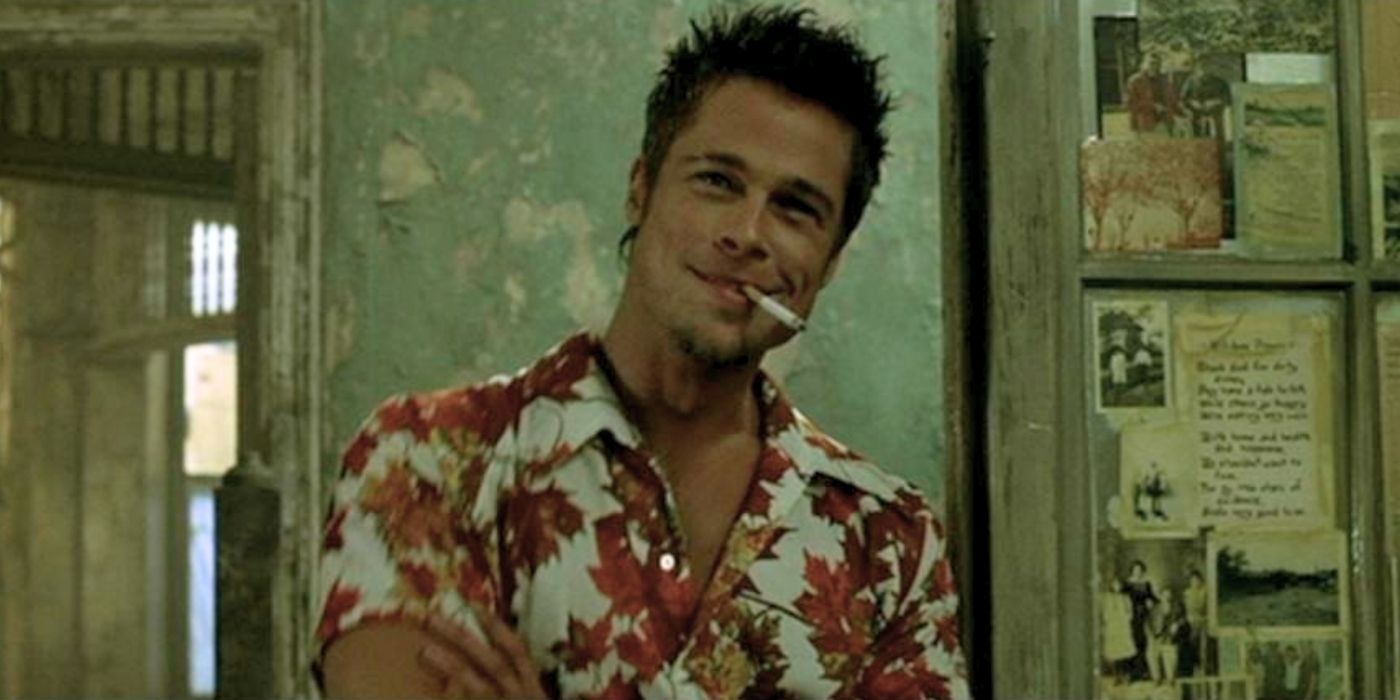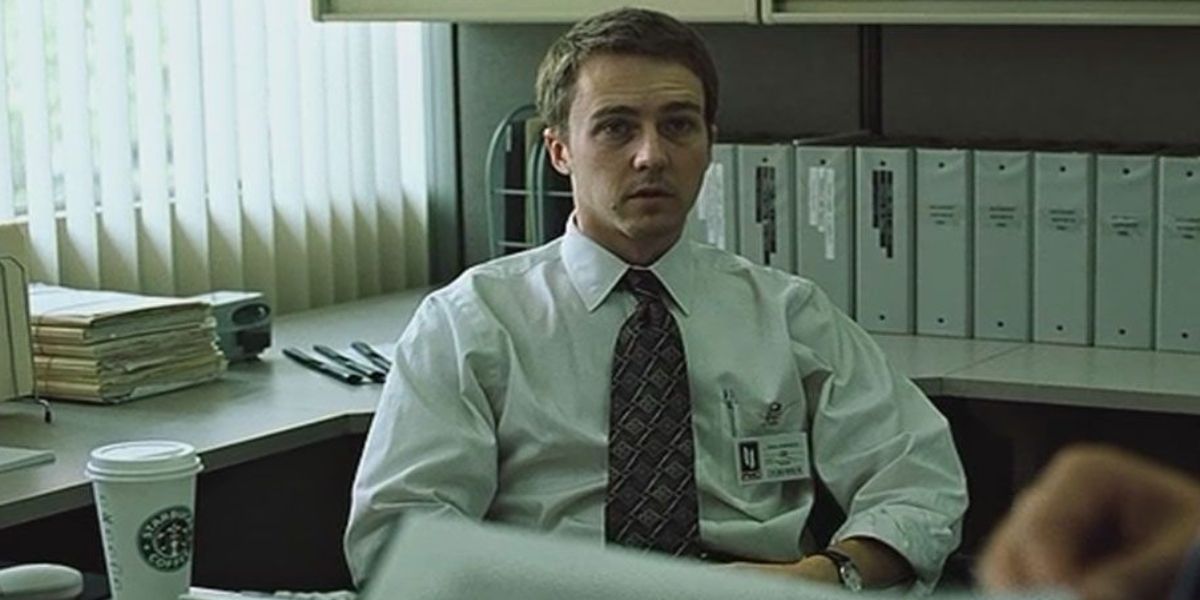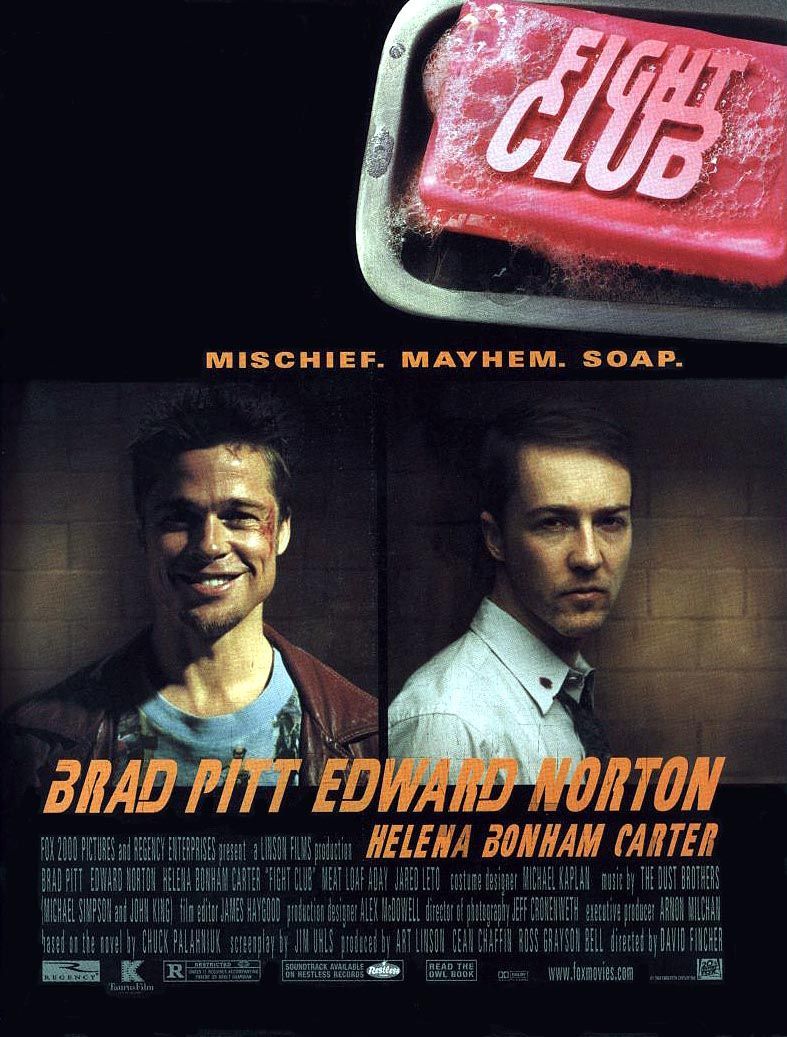
Unveiling 'Fight Club's Undisclosed Fixation on Starbucks

Discover the intriguing relationship between ‘Fight Club’ and Starbucks Uncover the hidden symbolism and strategic brand usage in David Fincher's masterpiece Prepare to be captivated by the not-so-secret, secret obsession
Article Summary
Fight Club uses strategic products, including Starbucks cups, to critique consumerist culture and capitalism.
Not every shot of the movie depicts a Starbucks cup, but the scenes that do are carefully selected to emphasize corporate greed and the removal of consumerist objects.
In addition to critiquing consumerism, Fight Club serves as a prominent illustration of the influence of advertising and the financial benefits brands can reap through product placement in movies.
Fight Club, the renowned film by David Fincher, explores a variety of themes, including masculinity, social anarchism, and the negative impact of consumer culture and capitalism. One of the most thought-provoking aspects of the movie is its examination of the notion that our possessions can end up dominating our lives, as aptly expressed by Tyler Durden's famous quote from Fight Club: "The things you own end up owning you." In their pursuit of meaning within a society that primarily evaluates individuals based on material possessions rather than their true identities, Tyler Durden (Brad Pitt) and the Narrator (Edward Norton) establish a club where men engage in brutal fights.
While Fight Club features various recognizable brands, one brand, in particular, has become inseparably linked to the film and is even rumored to appear in every scene. The iconic coffee giant Starbucks frequently showcases its unmistakable cups throughout the movie and stands out as one of the few brands explicitly mentioned by name. This inclusion raises intriguing questions: why does Fight Club, a movie that simultaneously critiques consumerism and serves as a remarkable advertisement, feature Starbucks, and what message does it convey?
David Fincher's ‘Fight Club’ Makes You Think
To begin, subliminal messaging is a key element in Fight Club. This is evident when Tyler, who works as a projectionist in a movie theater, secretly inserts brief frames of pornography into family films. The audience remains unaware of this manipulation, yet it subconsciously affects them, causing some to feel unsettled and others to become more interested in their romantic partners. However, it is revealed in the end that Tyler Durden is actually a creation of the Narrator's imagination. The Narrator himself has been orchestrating Fight Club, engaging in a relationship with Marla Singer (played by Helena Bonham Carter), and leading the chaotic anarchist group known as Project Mayhem.
No, ‘Fight Club’ Doesn't Have a Starbucks Cup in Every Shot
The Narrator's former occupation as a projectionist, during his time as Tyler, is never explicitly mentioned. However, the exploration of subliminal messaging remains significant. This approach extends to the product placement in Fight Club, where characters don't overtly mention specific brands but subtly drink from bottles strategically displaying their logos. As a result, viewers who later visit the liquor store may notice the same logo and find themselves purchasing and drinking the same beer as the enigmatic Tyler Durden, played by Brad Pitt.
Image courtesy of 20th Century Fox
On the flip side, Starbucks receives a less than flattering mention. In the beginning of Fight Club, the Narrator delves into his fixation on filling his surroundings with pointless items due to his dissatisfaction with life. He strongly criticizes the consumerist society while paradoxically taking part in it, bemoaning the potential future where a planet would be named "Starbucks" due to our obsession with brands, all the while purchasing every IKEA product imaginable. Everyone in his workplace indulges in Starbucks coffee, and a prominently displayed cup with the unmistakable logo of the two-tailed mermaid sits on his desk (although he discontinues this habit after encountering Tyler).
Director David Fincher has claimed that a Starbucks cup can be seen in every shot of Fight Club, creating a cinematic urban myth. However, this assertion is not accurate as there is not a Starbucks cup present in every scene or shot. It is true, though, that the cups are strategically placed in certain scenes. For instance, you will always find a Starbucks cup in the Narrator's workplace, which emphasizes the corporate greed depicted in the film. Additionally, a Starbucks cup can be spotted amidst the wreckage of the Narrator's apartment, symbolizing the destruction of his materialistic possessions. While there are other instances of Starbucks cups being used by background extras throughout Fight Club, one of the most significant gestures towards the brand comes when Project Mayhem is assigned to demolish both a corporate artwork and a franchise coffee bar. In this scene, the base of a large sculptural piece is exploded, which subsequently destroys a fictional coffee bar named Gratifico. Although not an actual Starbucks, this establishment's logo and use of Italian words for cup sizes closely resemble Starbucks's branding.
Starbucks Isn't Mad at ‘Fight Club’ Director David Fincher
Although Fight Club portrays Starbucks in a negative light, director David Fincher and Starbucks have no animosity towards each other. Fincher has acknowledged that while Starbucks began as a great coffee place, it has become too ubiquitous, symbolizing the excesses of a capitalist society. Starbucks was aware of its role in the narrative of Fight Club and approved of all references to their brand, albeit without allowing for any actual destruction of their stores.
For those disappointed by the absence of Starbucks cups in every shot or scene of Fight Club, it is important to realize that it would not have made sense. Placing a Starbucks cup alongside a close-up of an actor would be incongruous and distracting. Additionally, a significant portion of the movie takes place in Tyler Durden's rundown house, where the character rejects mainstream consumerism. It would be out of character for Tyler to stop for an expensive Chai latte or to leave evidence of his indulgence in his deteriorating living space. Similarly, the members of Fight Club would not be seen drinking Starbucks, as it would not align with the themes and atmosphere of the film.
Where Starbucks scenes lack, most of them feature some form of unofficial product placement. Notable examples include Krispy Kreme and Budweiser (because who doesn't enjoy cracking open a cold one after a brutal altercation with a friend?), but other brands like Pepsi, Gucci, Cadillac, BMW, and Apple are also shamelessly displayed. Interestingly enough, brand logos even make appearances when they aren't necessary. While it's easy to find a logo-free backpack, the Narrator sported a Jansport. And while the absence of a brand on an old office phone would go unnoticed, in the scene where the Narrator relentlessly beats himself up as his boss watches helplessly, there's a close-up of his phone with a conspicuous AT&T logo. According to Concave Brand Tracking, all this product placement generated substantial profits for the brands involved, highlighting how Fight Club, much like its Narrator, simultaneously serves as a scathing critique and a remarkable testament to the influence of advertising.
‘Fight Club' Uses Brands Like Starbucks and Budweiser Strategically
Image via 20th Century Studios
The pervasive consumerism within a capitalist society is ironically reinforced by this content. Even in a movie that is notorious for its anti-consumerism themes, consumerism is rampant. The cunning inclusion of products not only reveals the characters' and filmmakers' attitudes towards people's obsession with luxury brands, but also emphasizes the inescapable nature of consumerism. For instance, Tyler and the Narrator vandalize BMWs while sparing less valuable cars, yet Tyler himself still indulges in name-brand beer and expensive sunglasses. This contradiction highlights the characters' struggle to define their purpose, as they are unsure of what exactly they are fighting against. The same struggle is evident when the Project Mayhem crew celebrates their rebellious act of vandalizing a building by consuming a case of Busch beer, ultimately reinforcing the very brands they criticize for dominating their lives.
All this being said, Fight Club stands as one of the finest satires of the 20th century. The brilliance of the film's product placement underscores this notion. Through the incorporation of well-known brands like Starbucks, director David Fincher offers an unparalleled examination of how our lives are consumed by materialism, and how this insatiable desire for possessions can ultimately destroy us. Though the explicit advertising featured in Fight Club contradicts the film's core message, it is a deliberate choice, serving to illustrate that no matter how hard we try, we cannot break free from the grip of capitalism as long as we inhabit the realm of Planet Starbucks.
Fight Club
An office worker who suffers from insomnia and a reckless soap maker join forces to create an underground fight club that undergoes a remarkable transformation.
Release Date: October 15, 1999
Director: David Fincher
Cast: Edward Norton, Brad Pitt, Helena Bonham Carter, Meat Loaf, Zach Grenier, Richmond Arquette
Rating: R
Runtime: 139 minutes
Main Genre: Drama
Writers: Chuck Palahniuk, Jim Uhls
Tagline: Mischief. Mayhem. Soap.
Editor's P/S
In the film Fight Club, the pervasive presence of Starbucks cups serves as a critique of consumerism and capitalism. The movie's protagonist, the Narrator, is initially depicted as a disillusioned individual who finds solace in acquiring material possessions, including Starbucks coffee. However, as the plot progresses, the Narrator's obsession with consumerism is revealed to be a symptom of his deeper dissatisfaction with society.
The film's critique of consumerism is further emphasized by the fact that Starbucks is one of the few brands explicitly mentioned by name. This suggests that Starbucks is not simply a random product placement, but rather a deliberate choice by the filmmakers to highlight the pervasive influence of corporate culture in our society. Overall, the use of Starbucks cups in Fight Club is a clever and effective way to critique the negative impact of consumerism and capitalism on our lives.









